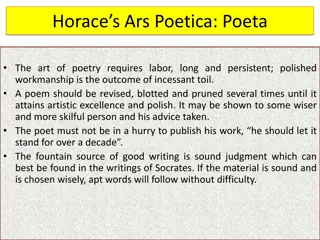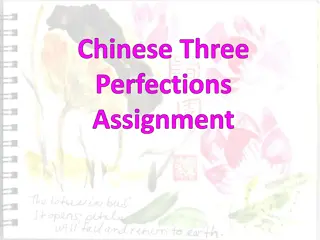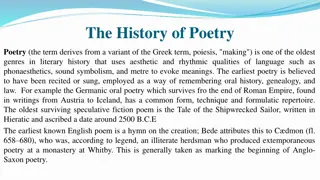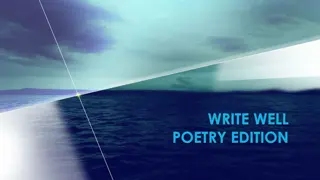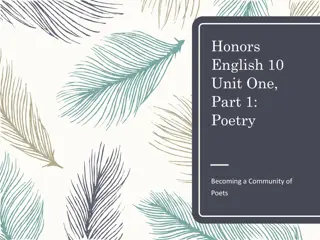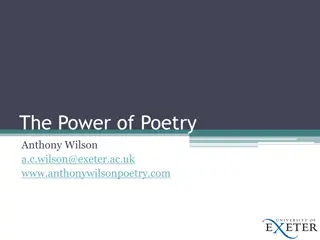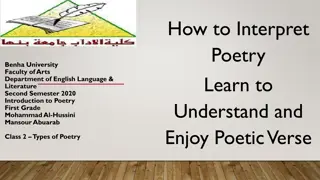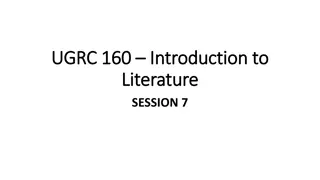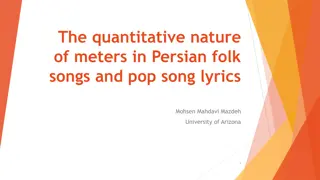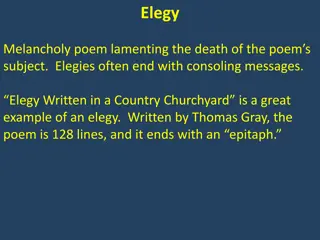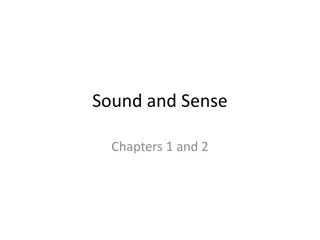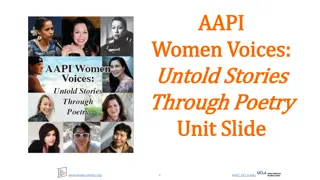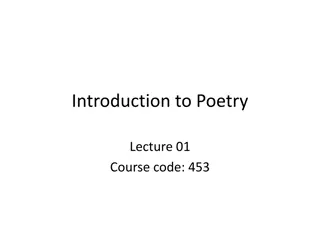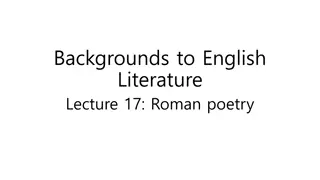Eloquent Poetry Collection: Okigbo, McKay, Lingyun, and Peters
Explore a captivating collection of thought-provoking poems by Christopher Okigbo, Claude McKay, Wen Lingyun, and Lenrie Peters. These evocative verses delve into themes of resilience, sacrifice, beauty, and introspection, inviting readers to reflect on the complexities of life and humanity.
Download Presentation

Please find below an Image/Link to download the presentation.
The content on the website is provided AS IS for your information and personal use only. It may not be sold, licensed, or shared on other websites without obtaining consent from the author. Download presentation by click this link. If you encounter any issues during the download, it is possible that the publisher has removed the file from their server.
E N D
Presentation Transcript
Compiled by Professor G.M.T Emezue
Hurrah for Thunder by Christopher Okigbo WHATEVER happened to the elephant- Hurrah for thunder The elephant, tetrarch of the jungle: With a wave of the hand He could pull four trees to the ground His four mortar legs pounded the earth: Wherever they treaded, The Grass was forbidden to be there. Alas! The elephant has fallen- Hurrah for thunder- But already the hunters are talking about pumpkins: If they share the meat let them remember thunder. The eye that looks down will surely see the nose; The finger that fits should be used to pick the nose. Today for tomorrow, today becomes yesterday: How many million promises can ever fill a basket... If I don't learn to shut my mouth I'll soon go to hell, I, Okigbo, town-crier, together with my iron bell. (Christopher Okigbo from New Poetry from Africa)
If we must die by Claude Mckay If we must die by Claude Mckay If we must die, let it not be like hogs Hunted and penned in an inglorious spot, While round us bark the mad and hungry dogs, Making their mock at our accursed lot. It we must die, 0 let us nobly die, So that our precious blood may not be shed In vain; then even the monsters we defy Shall be constrained to honour us though dead! 0 kinsmen! We must meet the common foe! Though far outnumbered let us show us brave, And for their thousand blows deal one deathblow! What though before us lies the open grave? Like men we'll face the murderous, cowardly pack, Pressed to the wall, dying, but fighting back!
To the tune of Pusa man by Wen Lingyun To the tune of Pusa man by Wen Lingyun Petals of deep creamy hue Her lofty tow'ring head dress strew With secret smile she stands arrayed Behind the gauzy curtain's shade They meet when peonies are gay He comes awhile, then goes away In golden clasp of em'rald sheen Two dancing butterflies are seen Does she remember former vows? Beneath bright moon flow'rs fill the boughs a a b b c c d d e e
The Fence by Lenrie Peters The Fence by Lenrie Peters There where all the opposites arrive To plague the inner senses, but do not fuse, I hold my head; and then contrive There where the dim past and future mingle Their nebulous hopes and aspirations There I lie. To stop the constant motion My head goes round and round, But I have not been drinking; I feel the buoyant waves; I stagger. There where truth and untruth struggle In endless and bloody combat, There I lie. There where time moves forwards and backwards With not one moment's pause for sighing, There I lie. It seems the world has changed her garment But it is I who have not crossed the fence, So there I lie. There where the need for good And 'the doing good' conflict. There I lie There where the body ages relentlessly And only the feeble mind can wander back There I lie in open-souled amazement. (Lenrie Peters, from A Selection of African Poetry)
Death Be not Proud by John Donne Death Be not Proud by John Donne DEATH be not proud, though some have called thee Mighty and draedful, for, thou art not soe, For, those, whom thou thinke'st thou dost overthrow, Die not, poore death, nor yet canst thou kill me. From rest and sleepe, which but thy pictures be, Much pleasure, then from thee, much more must flow, And soonest our best men with thee doe goe Rest of their bones, and soules deliver Thou art slave to Fate, Chance, Kings, and desperate men, And dost with poyson, warre, and sicknesse dwell, And poppie, or charmes can make us sleepe as well, And better than thy stroake; why swell'st thou then? One short sleepe past, we wake eternally, And death shall be no more; death, thou shalt die.
Mourning Song for Rangiaho by Te Heuheu Herea Mourning Song for Rangiaho by Te Heuheu Herea Many women call on me to sleep with them But I'll have none so worthless and so wanton There is not one like Rangiaho, so soft to feel Like a small, black eel I would hold her again Even the wood in which she lies; But like the slender flax stem She slides from the first to the second heaven The mother of my children Gone Blown by the wind Like a spume of a wave Into the eye of the void (From GMT Emezue, African Dirge Poetry) i
La Belle Dame Sans Merci by John Keats She found me roots of relish sweet And honey wild, and manna dew And sure in language strange she said I love thee true O what can ail thee, knight at arms, Alone and palely loitering? The sedge has withered from the lake And no birds sing She took me to her elfin grot And there she wept, and sigh d full sore And there I shut her wild eyes With kisses four O what can ail thee, knight at arms, So haggard and so woe-begone? The squirrel's granary is full, And the harvest's done. And there she lulled me asleep And there I dream d Ah! Woe betide! The latest dream I ever dream d On the cold hill s side I see a lily on they brow With anguish moist and fever dew, And on the cheeks a fading rose Fast withereth too. I saw pale kings, and princes too, Pale warriors, death pale were they all They cried La belle dame sans merci Hath thee in thrall! I met a lady in the meads, Full beautiful, a fairy's child; Her hair was long, her foot was light, And her eyes were wild. I saw their starv d lips in the gloom With horrid warning gaped wide And I awoke and found me here On the cold hiil s side I made a garland for her head, And bracelets too and fragrant zone, She look d at me as she did love And made sweet moan And this is why I sojourn here Alone and palely loitering Though the sedge is withere d from the lake And no birds sing I set her on my prancing steed, And nothing else saw all daylong For sidelong would she bend and sing A fairy s song
Ogun (Traditional Yoruba poem) Ogun (Traditional Yoruba poem) Ogun is not like maize gruel: Do you think you can knead him in your hand And eat of him until ,you are satisfied? Ogun is not like something you can throw in your cap: Do you think you can put on your cap and walk away with him? Ogun scatters his enemies When the butterflies arrives at the place where the cheetah excretes They scatter in all directions. The light shining on Ogun's face is not easy to behold Ogun let me not see the red of your eye. Ogun sacrifices an elephant to his head Master of iron, head of warriors, Ogun, great chief of robbers. Ogun wears a bloody cap. Ogun has four hundred wives and one thousand four hundred children Ogun, the fire that sweeps the forest. Ogun's laughter is no joke. Ogun eats two hundred earthworms and does not vomit. Ogun is a crazy (deity) who still asks questions after 780 years Whether I can reply, or whether I cannot reply, Ogun please don't ask me anything. The lion never allow his child to be punished. Ogun do not reject me! Does the woman who dyes ever reject a spindle? Does the eye that sees ever reject a sight? Ogun, do not reject me! (Ogun needs his worshippers) Ogun kills on the right and destroys on the right, Ogun kills on the left and destroys on the left. Ogun kills suddenly in the house and suddenly in the field, Ogun kills the child with the iron with which it plays Ogun kills in silence. Ogun kills the thief and the owner of the stolen goods. Ogun kills the owner of the slave and the slave runs away. Ogun kills the owner of thirty 'iwofa' (pawns) and his money, wealth and children disappear Ogun kills the owner of the house and paints the earth with his blood Ogun is the death who pursues a child until it runs into the bush Ogun is the needle that pricks at both ends. Ogun has water but he washes in blood. Ogun do not fight me, I belong only to you. The wife of Ogun is like a tim tim (decorated leather cushion) She does not like two papaw to rest on her. Ogun has many gowns. He gives them all to the beggars. He gives one to the woodcock the woodcock dyes it indigo He gives one to the coucal the coucal dyes it in camwood He gives one to the cattle egret the cattle egret leaves it white Ogun is not like pounded yam; Do you think you can knead him in our hand And eat of him until you are satisfied?
Doughnuts Doughnuts Doughnuts are good Good! Good! Good! Doughnuts are brown Doughnuts are fat Fat! Fat! Fat! Doughnuts are round Round! Round! Round
The Epidemic by Chinweizu The Epidemic by Chinweizu When the epidemic of terror erupted A lava of fear enriched the soil; Strong hatreds sprouted on whiffs of doubt Like buds at the breath of spring. A lamb of suspicion hung over the land As men were denounced whose looks were disliked; Coagulated fear and insecurity Made stronger, yet more tenuous ties Than fearless confidence. As sensible bravery Stood rooted in caution, the streets were choked With panicked battalions of frenzied fear. The wraith of distrust, rolling his eyes, And waving a gun, sent shot after shot Into the ranks of barricaded trembling; While terror in terror found a friend (from Energy Crisis and other poems)
A Voice from the Dead by Mtshali Oswald A Voice from the Dead by Mtshali Oswald WHAT! Yes, God is The crippled beggar Sprawling at the street comer. I heard it In my sleep Calling me soft There is no hell burning With sulphurand brimstone. It was My mother Speaking from her grave. WHAT! My son! There is no heaven Above the clouds. Yes, Hell is The hate flickering In your eye. (Oswald Mitshali, From New Poetry from Africa: 88) WHAT! Yes, Heaven is in your heart. God is no picture With a snow-white beard.
My Last Duchess by Robert Browning The bough of cherries some officious fool Broke in the orchard for her, the white mule She rode with round the terrace all and each Would draw from her alike the approving speech, Or blush, at least. She thanked men, - good! But Thanked Somehow I know not how as if she ranked My gift of a nine-hundred-years- old name With anybody s gift. Who d stoop to blame This sort of trifling? Even had you skill In speech (which I have not) to make your will Quite clear to such an one, and say, Just this Or that in you disgusts me; here you miss, Or there exceed the mark and if she let Herself be lessened so, nor plainly set Her wits to yours, forsooth, and made excuse, -E en then would be some stooping; and I choose Never to stoop. Oh sir, she smiled, no doubt, Much the same smile? This grew, I gave commands; Then all smiles stopped together. There she stands As if alive. Will t please you rise? We ll meet The company below, then. I repeat, The Count your master s known munificence Is ample warrant that no just pretence Of mine for dowry will be disallowed; Though his fair daughter s self, as I avowed At starting, is my object. Nay, we ll go Together down, sir. Notice Neptune, though, Taming a sea-horse, thought a rarity, Which Claus of Innsbruck cast in bronze for me! (From Six Centuries of Verse) That s my last duchess painted on the wall, Looking as if she were alive. I call That piece a wonder, now: Fra Pandolf s hands Worked busily a day, and there she stands. Will't please you sit and look at her? I said 'Fra Pandolf by design, for never read Strangers like you that pictured countenance, The depth and passion of its earnest glance, But to myself they turned (since none puts by The curtain I have drawn for you, but I) And seemed as they would ask me, if they durst, How such a glance came there; so, not the first Are you to turn and ask thus. Sir twas not Her husband s presence only, called that spot Of joy into the Duchess cheek: perhaps Fra Pandolf chanced to say Her mantle laps Over my lady s wrist too much, or Paint Must never hope to reproduce the faint Half-flush that dies along her throat : such stuff Was courtesy, she thought, and cause enough For calling up that spot of joy. She had A heart how shall I say? too soon made glad, Too easily impressed; she liked whate er She looked on, and her looks went everywhere Sir, twas all one! My favour at her breast The dropping of the daylight in the West,
THE SOLITARY REAPER by William Wordsworth THE SOLITARY REAPER by William Wordsworth Will no one tell me what she sings? Perhaps the plaintive numbers flow For old, unhappy, far-off things, And battles log ago: Or is it some more humble lay, Familiar matter of to-day? Some natural sorrow, loss or pain, That has been, and may be again? Behold her, single in the field, Yon solitary Highland Lass! Reaping and singing by herself; Stop here, or gently pass! Alone she cuts and binds the grain, And sings a melancholy strain; O listen ! For the Vale profound Is overflowing with the sound. Whate er the theme, the Maiden sang As if her song could have no ending; I saw her singing at her work, And o er the sickle bending; - I listened, motionless and still; And, as I mounted up the hill, The music in my heart I bore, Long after it was heard no more. No Nightingale did ever chaunt More welcome notes to weary bands Of travellers in some shady haunt, Among Arabian sands: A voice so thrilling ne er was heard In spring-time from the Cuckoo-bird Breaking the silence of the seas Among the fairest Hebrides.
The Daffodils by William Wordsworth The Daffodils by William Wordsworth I wandered lonely as a cloud That floats on high over vales and hills When all at once I saw a crowd A host of golden daffodils Besides the lake, beneath the trees Fluttering and dancing in the breeze... Continuous as the stars that shine And twinkle on the Milky Way They stretched in never ending line Along the margin of a bay Ten thousand saw I at a glance, Tossing their heads in sprightly dance The waves beside them danced but they Outdid the sparkling waves in glee :- A poet could not but be gay In such a jocund company! I gazed -and gazed- but little thought What wealth the show to me had brought. For oft, when on my couch I lie In vacant or in pensive mood They flash upon that inward eye Which is the bliss of solitude; And then my heart with pleasure fills And dances with the daffodils.
'Stanley meets Mutesa' by David Rubadiri 'Stanley meets Mutesa' by David Rubadiri's The Nile and the Nyanza Lay like twins Azure across the green countryside. The march leapt on chanting Like young gazelles to a water hole. Hearts beat faster, Loads felt lighter As the cool water lapped their sore soft feet. No more the dread of hungry hyenas But only tales of valour when No more the burning heat of the day But song, laughter and dance. The village looks on behind banana groves, Children peer behind reed fences. Such was the welcome. No singing women to chant a welcome Or drums to greet the white ambassador; Only a few silent nods from aged faces And one rumbling drum roll To summon Mutesa's court to parley For the country was not sure. The gate of reds is flung open. There is silence But only a moment's silence A silence of assessment. The tall black king steps forwards. He towers over the thin bearded white man Then grabbing his lean white hand Manages to whisper 'Mtu Mweupe Karibu' White man you are welcome. The gate of polished reed closes behind them And the west is let in. Such a time of they had; The heat of the day, The chill of the night And the mosquitoes that followed. Such was the time and They bound for a kingdom The thin weary line of carriers With tattered dirty rags to cover their backs; The battered bulky chests That kept on falling off their shaven heads. Their tempers high and hot, The sun fierce and scorching With it rose their spirits, With its fall their hopes As each day sweated their bodies dry and Flies clung in clumps on their sweat-scented backs. Such was the march. And the hot season just breaking. Each day a weary pony dropped, Left for the vultures on the plains: Each afternoon a human skeleton collapsed, Left for the Masai on the plains; But the march trudged on Its khaki leader in front He the spirit that inspired. He the light of hope.
I will pronounce your name by Leopold Senghor I will pronounce your name by Leopold Senghor I will pronounce your name, Naett, I will declaim you, Naett! Naett, your name is mild like cinnamon, it is the fragrance in Which the Lemon grove sleeps, Naett, your name is the sugared clarity of blooming coffee trees And it resembles the savannah, that blossoms forth under the Masculine ardourof the midday sun. Name of dew, fresher than shadows of tamarind, Fresher even than the short dusk, when the heat of the day is Silenced. Naett, that is the dry tornado, the hard clap of lightning Naett, coin of gold, shinning coal, you my night, my sun!...
TERROR by Peter Onwudinjo TERROR by Peter Onwudinjo Who can tell the terror In the flight Of the wrenched-off heads in spray, Or the grotesque stagger of the head Less trunk in flight Oh Lord how he ran! How he fell! how he slumped! Who can stand the jab of rib cages That fell in battles long ago, Or the eyeless stare of skulls Smashed up long ago; The ceaseless twang and whine of death That poured all day night, From the glow-lipped guns And the thump and roar of rockets and endless bombs And crash and anguished cries, The hellish howls that rose and rose Above the din of fire and blood That poured from mouths and guts That never can speak again. (From Women of Biafra and other Poems)
UNSPOKEN AGONIES by Peter Onwudinjo UNSPOKEN AGONIES by Peter Onwudinjo The forest is deep In mourning. Tears for trees beheaded Defrocked and burnt to stumps; Tears for guts and brains battered to bits . Tears for unspoken agonies Floating in the soot- dust of war. Are those bayonet sounds retreating Or coming? (From Women of Biafra and other Poems)
The Vultures byDavid Diop The Vultures by David Diop In those days When civilisation kicked us in the face When holy water slapped our cringing brows The vultures built in the shadow of their talons The bloodstained monument of tutelage In those days There was painful laughter on the metallic hell of the roads And the monotonous rhythm of the paternoster Drowned the howling on the plantations. 0 the bitter memories of extorted kisses Of promises broken at the pint of a gun Of foreigners who did not seem human Who knew all the books but did not know love. But we whose hands fertilise the womb of the earth In spite of your songs of pride Hope was preserved in us as in a fortress And from the mines of Swaziland to the factories of Europe Spring will be reborn under our bright steps.
They too are the earth by Niyi Osundare They too are the earth by Niyi Osundare They too are the earth The old dying distant deaths In narrow abandoned hamlets They are the earth Women battling centuries of Maleficent slavery They too are the earth The swansongs of beggars sprawled out In brimming gutters They are the earth Under snakeskin shoes and Mercedes tyres Are they of this earth Who fritter the forest and harry the hills Are they of this earth Who live that earth may die Are they? They too are the earth The sweat and grime of Millions hewing wood and hurling water They are the earth Muddy every pore like naked moles They too are the earth The distant groans of thousands buried alive In hard, unfathomable mines They are the earth Of gold dreams and blood banks
Psalm of Life by H.W Longfellow In the world s broad field of battle In the bivouac of men Be not like dumb driven cattle Be a hero in the strife TELL me/ NOT, in/ MOURNful/ NUMbers, LIFE is/ BUT an/ EMPty/ DREAM! FOR the/ SOUL is/ DEAD that/ SLUMbers AND things/ARE NOT/ WHAT they/ SEEM Life is real, life is earnest And the grave is not its goal Dust thou art to dust returneth Was not spoken of the soul Lives of great men all reminds us We can make our lives sublime And departing leave behind us Footprints on the sands of time Not enjoyment and not sorrow Is our destined end or way But to act that each tomorrow Finds us farther than today Footprints that perhaps another Falling o er life s solemn mien A forlorn and shipwrecked brother Seeing shall take heart again Art is real and time is fleeting And our hearts though stout and brave Still like muffled drums are beating Funeral marches to the grave Let us then be up and doing With a heart for any fate Still achieving still pursuing Learn to labourand to wait Trust no future howe er pleasant Let the dead past bury its dead Act, act in the living present Heart within and God o er head
Poetry is fun Thank You




